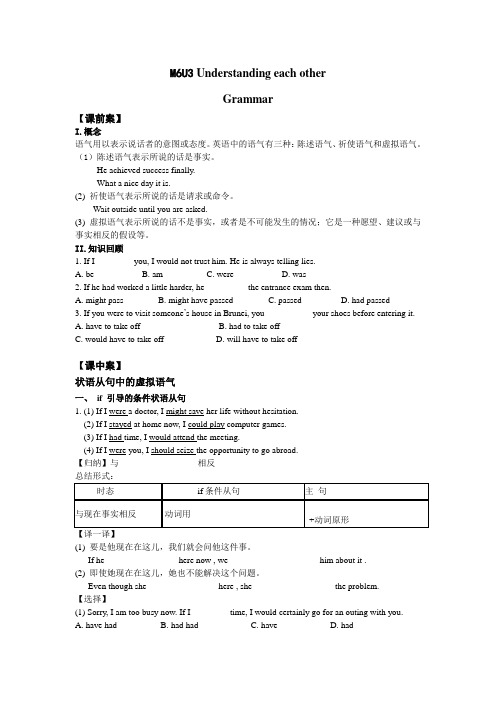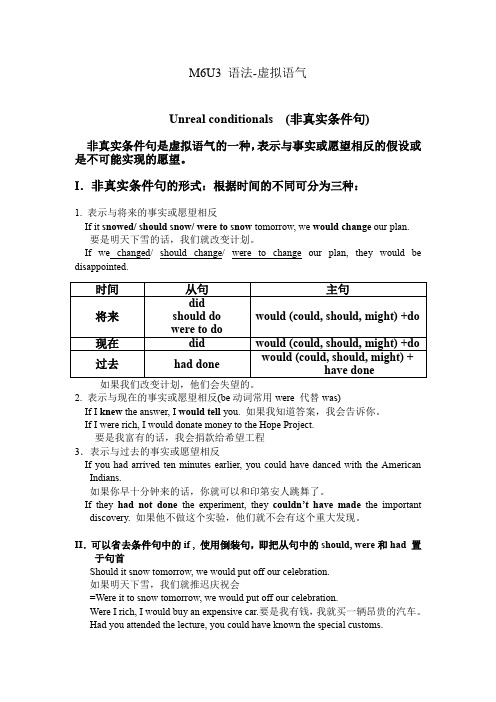牛津高中英语M6Unit3 Grammar虚拟语气
- 格式:ppt
- 大小:7.32 MB
- 文档页数:65

M6U3Understanding each otherGrammar【课前案】I.概念语气用以表示说话者的意图或态度。
英语中的语气有三种:陈述语气、祈使语气和虚拟语气。
(1)陈述语气表示所说的话是事实。
He achieved success finally.What a nice day it is.(2) 祈使语气表示所说的话是请求或命令。
Wait outside until you are asked.(3) 虚拟语气表示所说的话不是事实,或者是不可能发生的情况;它是一种愿望、建议或与事实相反的假设等。
II.知识回顾1. If I ________ you, I would not trust him. He is always telling lies.A. beB. amC. wereD. was2. If he had worked a little harder, he _________ the entrance exam then.A. might passB. might have passedC. passedD. had passed3. If you were to visit someone’s house in Brunei, you __________ your shoes before entering it.A. have to take offB. had to take offC. would have to take offD. will have to take off【课中案】状语从句中的虚拟语气一、if 引导的条件状语从句1. (1) If I were a doctor, I might save her life without hesitation.(2) If I stayed at home now, I could play computer games.(3) If I had time, I would attend the meeting.(4) If I were you, I should seize the opportunity to go abroad.【归纳】与_________________ 相反总结形式:(1) 要是他现在在这儿,我们就会问他这件事。


M6U3 语法-虚拟语气Unreal conditionals (非真实条件句)非真实条件句是虚拟语气的一种,表示与事实或愿望相反的假设或是不可能实现的愿望。
I.非真实条件句的形式:根据时间的不同可分为三种:1. 表示与将来的事实或愿望相反If it snowed/ should snow/ were to snow tomorrow, we would change our plan.要是明天下雪的话,我们就改变计划。
If we changed/ should change/ were to change our plan, they would be disappointed.2. 表示与现在的事实或愿望相反(be动词常用were 代替was)If I knew the answer, I would tell you. 如果我知道答案,我会告诉你。
If I were rich, I would donate money to the Hope Project.要是我富有的话,我会捐款给希望工程3.表示与过去的事实或愿望相反If you had arrived ten minutes earlier, you could have danced with the American Indians.如果你早十分钟来的话,你就可以和印第安人跳舞了。
If they had not done the experiment, they couldn’t have made the important discovery. 如果他不做这个实验,他们就不会有这个重大发现。
II.可以省去条件句中的if , 使用倒装句,即把从句中的should, were和had 置于句首Should it snow tomorrow, we would put off our celebration.如果明天下雪,我们就推迟庆祝会=Were it to snow tomorrow, we would put off our celebration.Were I rich, I would buy an expensive car.要是我有钱,我就买一辆昂贵的汽车。



Section ⅢGrammar——虚拟语气(Ⅰ)语境自主领悟先观察原句后自主感悟1.If I were you,I should try my best togo to college.2.Were I you,I should try my best to goto college.3.If he had gone to the party last night,everything would have changed.4.Had he gone to the party last night,everything would have changed.5.If it were to be sunny tomorrow,wewould go out for a picnic.6.Were it to be sunny tomorrow,we wouldgo out for a picnic.1.1、2句表示与现在事实相反的假设。
2.3、4句表示与过去事实相反的假设。
3.5、6句表示与将来事实相反的假设。
4.句1、2、3、4、5、6句的句意分别相同吗?相同。
5.句2、4、6共同的特点是:省略if后的倒装句。
一、非真实(虚拟)条件句中的虚拟语气1.与现在事实相反条件从句主句did(be多用were,非正式文体中也可用was)would/should/could/might+动词原形如果我是你,我会接受这份工作。
If I had time,I would go there.如果我有空,我就去那儿。
2.与过去事实相反条件从句主句had done would/should/could/might+have done如果你早点来,你就会见到那位明星了。
If he had seen you yesterday,he would have returned you your book.如果他昨天见到你,他就会还给你书的。
牛津模块6Unit3语法教学案:虚拟语气(译林牛津版高二英语选修六教案教学设计)Period5 Grammar and UsageTeaching Objectives:e unreal conditionals of the present, past or future time.2. Improve students’ ability of using unreal conditionalsTeaching Procedures:Step1 Lead-inLook at the two sentences1.If it were Sunday, I would go hiking.2. If I were a bird, I could fly.Think about the questions1,If it were Sunday, what would you do?2.Is it real that it is Sunday today?3.Is it possible for you to be a bird?Step2 Presentation虚拟语气1)概念虚拟语气用来表示说话人的主观愿望或假想,所说的是一个条件,不一定是事实,或与事实相反2)在条件句中的应用条件句可分为两类,一类为真实条件句,一类为非真实条件句。
非真实条件句表示的是假设的或实际可能性不大的情况,故采用虚拟语气.e.g. If he had seen you yesterday, he would have asked you about it .如果他昨天见到你,他会问你这件事的。
If it doesn’t rain tomorrow, we will go to the park.如果明天不下雨的话,我们就去公园。
一:虚拟语气在条件状语从句中的用法。
条件从句从句主句与现在事实相反动词的过去式(be的过去式一般用were)would/ should/ could/ might + 动词原形与过去事实相反 had + 过去分词 would/ should/ could/ might + have + 过去分词与将来事实相反 1.动词过去式2.should + 动词原形3.were to + 动词原形 would/ should/ could/ might + 动词原形1、表示与现在事实相反的假设和结果e.g.我是你的话,我会马上走。